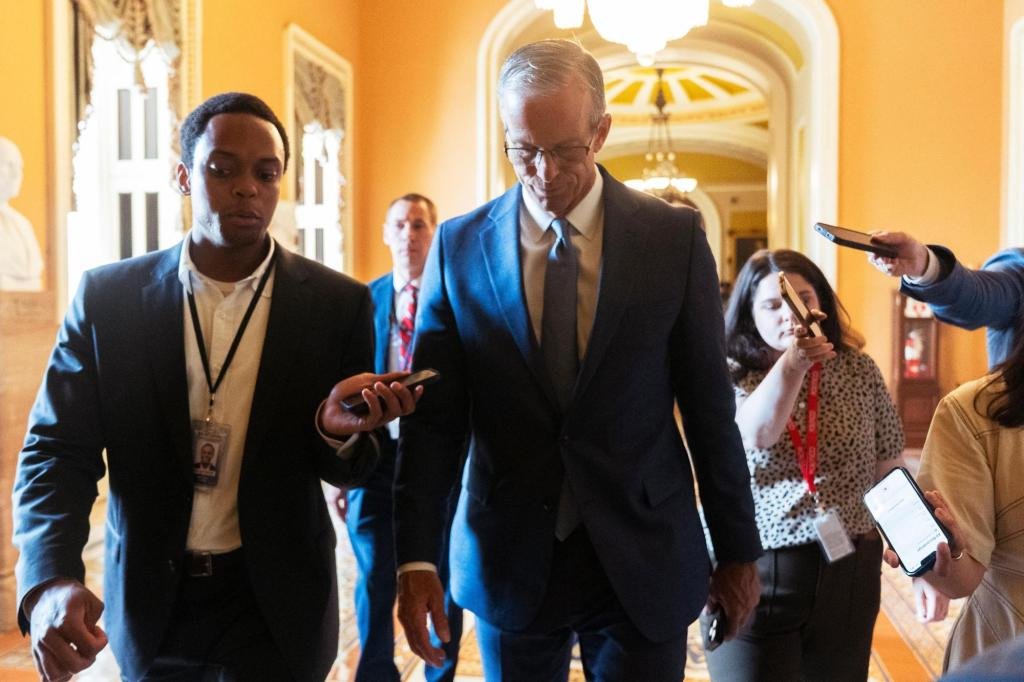Senate’s Night of Reckoning: The Battle Over Trump’s “One Big Beautiful Bill”
As the clock struck midnight in Washington, D.C., the Senate’s marble halls resonated with the echoes of a fierce political showdown. The air was thick with tension as legislators grappled with President Donald Trump’s massive legislative proposal—a sweeping package that could redefine the nation’s fiscal landscape. Senators, bleary-eyed from hours of deliberation, found themselves locked in a bitter struggle over tax breaks, spending cuts, and the healthcare safety net. The stakes were high; behind the scenes, millions of Americans awaited the outcome, their futures hanging in the balance.
The Context of Crisis
The “One Big Beautiful Bill Act,” a 940-page document laden with reforms and cuts, emerged as a litmus test for the Republican Party’s unity. With a majority that could afford no more than a few defections, Senate Majority Leader John Thune of South Dakota paced the chamber, trying to find a delicate balance between the moderates and the hardliners. “If we don’t secure enough votes, this bill could flounder, and we’ll lose our chance to make meaningful changes,” a GOP aide whispered in a moment of rare candor.
The complexities of this bill came to life in dramatic fashion during a process known as “vote-a-rama.” Under this chaotic practice, every proposed amendment is considered in a whirlwind of discussions and roll calls, turning what initially seemed like a systematic process into an overnight marathon of legislative combat.
Divided Along Party Lines
The discontent within the Republican ranks was palpable. Key figures like Senators Lisa Murkowski of Alaska and Susan Collins of Maine found themselves at a crossroads. While both were concerned about cuts to Medicaid that could leave millions without healthcare, they also faced pressure from a coalition of conservative senators unwilling to back down on tax cuts. In a strategic move, Collins attempted to enhance rural healthcare funding, only to see her amendment languish, drawing frustrated sighs from her colleagues. “We’re at an impasse,” she remarked, visibly exasperated.
- Murkowski focused on protecting Alaskans from SNAP cuts.
- Collins aimed to double rural hospital funding from $25 billion to $50 billion.
- Conservative senators rallied for deeper cuts to healthcare and ongoing tax breaks.
The Political Theater Unfolds
The late-night drama did not escape the eyes of the American public. Vice President JD Vance, posted near the Capitol, pledged to intervene at a moment’s notice should a tie arise. “This is not just about passing a bill; it’s about showing the American people that we can deliver,” he tweeted, capturing the mood of urgency flowing through Republican ranks.
Yet, the Democratic opposition was relentless. Senate Minority Leader Chuck Schumer stood as a sentinel at the doors of the chamber, assessing each minor victory for his party as they mounted a last-ditch effort to delay the bill’s passage. “What we’re witnessing is a party in disarray,” Schumer asserted. “They know this bill is unpopular, and they’re scrambling to find a way out.” A recent study indicated that nearly 57% of Americans disapproved of the proposed cuts to Medicaid, underscoring the precariousness of the GOP’s position.
The Fiscal Implications
The Congressional Budget Office provided a sobering analysis of the bill’s implications, projecting the potential loss of health coverage for 11.8 million Americans by 2034 if it were enacted. “This isn’t just a game of numbers; these are millions of lives affected by policy decisions,” said Dr. Emily Carter, a public policy expert at Georgetown University. The ramifications could reverberate through the economy, destabilizing the already fragile healthcare sector.
Senators, fearing the backlash from constituents, were caught in a crossfire of their own making. The bill’s contentious components included:
- $4.5 trillion in tax cuts extending Trump’s prior fiscal policies.
- Significant reductions in Medicaid and food stamp programs.
- A contentious expansion of border security funding.
A Public Outcry
Outside the Capitol, anger simmered among citizens. Protesters carrying cardboard caskets demonstrated against the legislation, illustrating what many viewed as a moral failure by the government. “This bill doesn’t just cut funds; it cuts lives,” community organizer Sarah Taylor proclaimed, wielding a megaphone. Her sentiments reflected broader concerns from various advocacy groups that foresee a loss of crucial services for society’s vulnerable populations.
Additionally, social media buzzed with criticism from all corners. Billionaire entrepreneur Elon Musk took to Twitter, lambasting the GOP’s maneuver as “the PORKY PIG PARTY,” drawing laughter from some but intensifying scrutiny on the party’s spending behavior.
The Uncertain Road Ahead
The late-night session illuminated a party fraying at the seams. Moderates voiced deep concerns over the implications for healthcare, while hardliners pressed for even more aggressive cuts. With influential Republican senators like Thom Tillis and Rand Paul already indicating their unwillingness to support the measure under its current form, a precarious alliance was at stake.
As discussions faded into the early dawn, the enormity of the impending decisions loomed large. Every vote carried weight, not only in the halls of power but also in the homes of countless Americans. “This is a defining moment,” observed Dr. Jason Martinez, a political analyst. “How the Republicans navigate this crossroads could either solidify their dominance or fracture their base irreparably.”
Thus, beyond the Senate’s realm, the bill began to shape dialogue both locally and nationally, leaving a potent question unanswered: what sacrifices are Americans willing to accept in the name of fiscal policy? As the sun rose over Capitol Hill, the answer remained uncertain.





